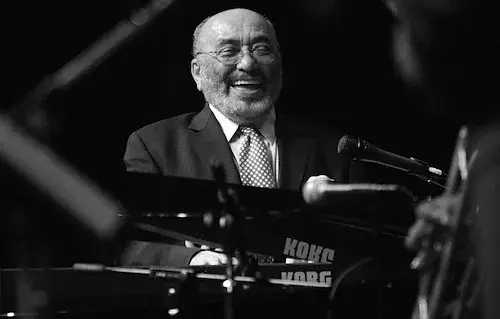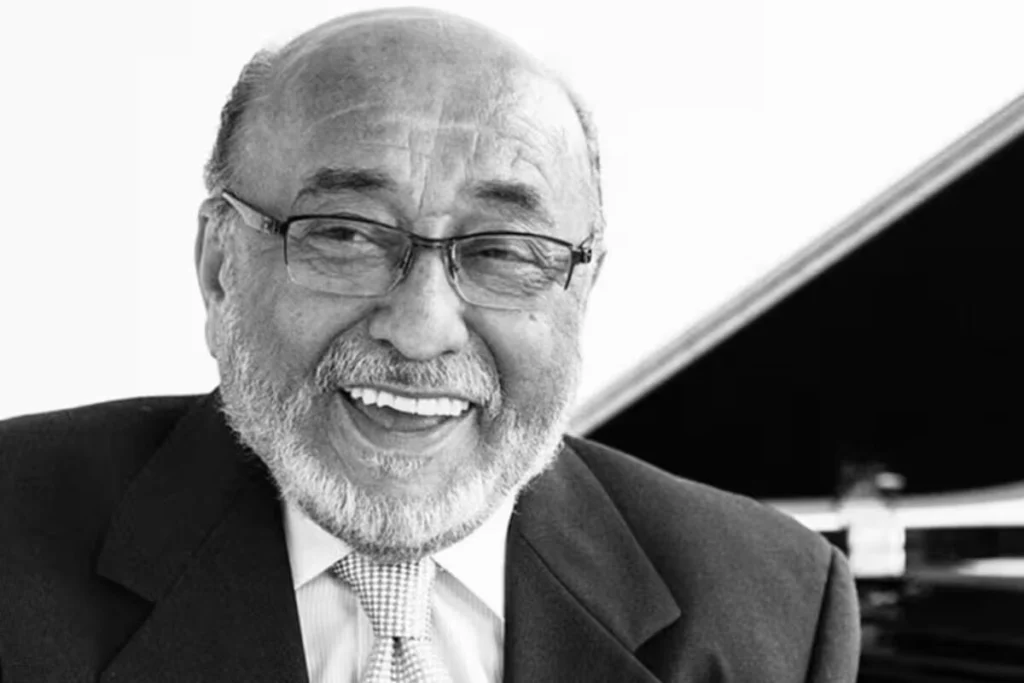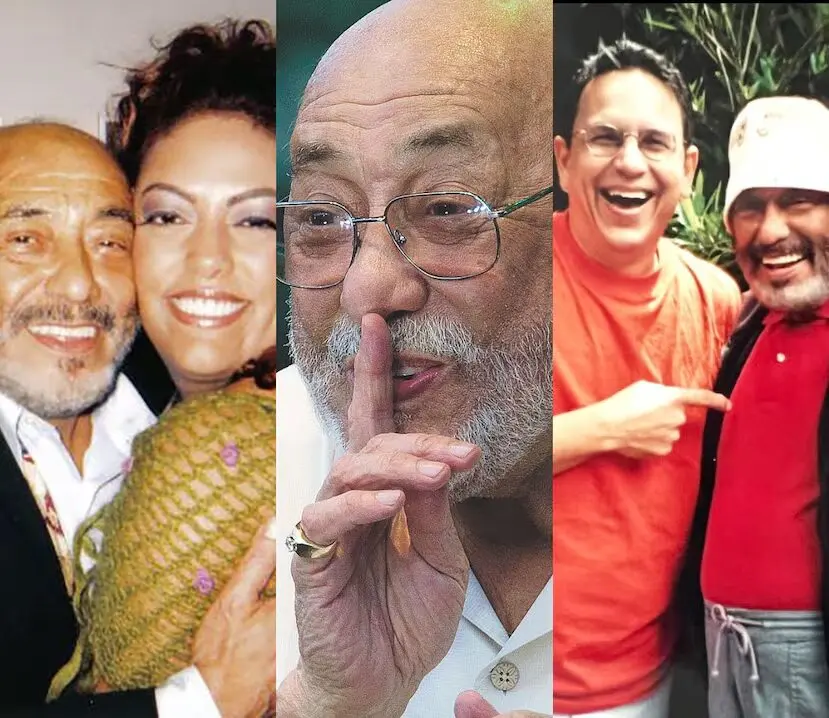Eddie Palmieri, legendary pianist and pioneer of salsa and Latin jazz, dies at 88.

Eddie Palmieri salsa legend: The “Giant of the Piano” revolutionized Latin music from New York to the world Photo: perplexity 6/8/2025
August 6, 2025 Hour: 10:23 pm
Eddie Palmieri salsa legend dies at 88, leaving behind a revolutionary legacy in salsa, Latin jazz, and Afro-Caribbean music. Discover his impact, Grammy wins, and cultural resistance.
Related: Jamaica Flower: A Global Blossom of Culture, Wellness, and Tradition
7 Proven Truths About Eddie Palmieri Salsa Legend: How the “Giant of the Piano” Revolutionized Latin Music
On August 6, 2025, the world of music lost one of its most revolutionary voices. Eddie Palmieri, the legendary pianist, composer, and bandleader known as “El Gigante del Piano”, passed away in New York City at the age of 88. His death, confirmed by family members, sent waves of grief through the global Latin music community, marking the end of an era defined by innovation, resistance, and rhythmic brilliance.
The Eddie Palmieri salsa legend was not just a musician—he was a cultural architect who reshaped Afro-Caribbean music for generations.
Born on December 15, 1936, in the heart of East Harlem, to Puerto Rican parents, Palmieri began playing piano at the age of eight and quickly developed a powerful, percussive style that fused Afro-Cuban rhythms, jazz harmonies, funk grooves, and soulful improvisation. His music was not only for dancing—it was for thinking, feeling, and resisting.
In a world that often separates art from activism, Palmieri’s music was both a celebration and a protest.
From the early 1960s onward, he led groundbreaking ensembles like La Perfecta, La Perfecta II, and Harlem River Drive, each pushing the boundaries of what Latin music could be. He pioneered the “trombanga” sound—replacing traditional trumpets with powerful trombone sections—creating a deeper, brass-heavy groove that became a hallmark of the New York salsa movement.

Eddie Palmieri Salsa Legend: A Revolutionary Sound and a Voice for the People
Palmieri’s discography is a masterclass in musical evolution. Albums like Azúcar pa’ ti (1965), Muñeca (1967), and Vámonos pa’l monte (1971) are not just classics—they are cultural landmarks that redefined Latin music’s sonic and political landscape.
When Eddie Palmieri played, he wasn’t just performing—he was declaring a cultural revolution.
His 1975 album Unfinished Masterpiece fused jazz fusion with Afro-Cuban roots, while Harlem River Drive (1971) blended salsa with funk and psychedelic soul, prefiguring the rise of Latin boogaloo and later Latin hip-hop. These works were ahead of their time, earning him the nickname “The Sun of Latin Music” (El Sol de la Música Latina).
He was a central figure in the Fania All Stars, the legendary collective that brought salsa to global audiences. Sharing stages with icons like Celia Cruz, Héctor Lavoe, Rubén Blades, and Willie Colón, Palmieri was not just a performer—he was a musical general, leading the charge in the salsa explosion of the 1970s.
The Fania era was a golden age of Latin music—and Palmieri was one of its architects.
Over his six-decade career, he won nine Grammy Awards, including a Lifetime Achievement Award in 2013 from the Latin Recording Academy. That same year, he was honored with the Latin Grammy for Musical Excellence, a testament to his artistic depth and enduring influence.
External Link: Latin Grammy Awards – Eddie Palmieri Tribute
External Link: Smithsonian Folkways – Latin Jazz Collection
Geopolitical Context: Salsa as Resistance in a Divided America
The Eddie Palmieri salsa legend must be understood within the broader struggle of the Latinx diaspora in the United States. His music emerged from the barrios of New York, where Puerto Rican, Cuban, and Dominican communities faced systemic racism, poverty, and cultural erasure.
Salsa was never just entertainment—it was a weapon of cultural survival.
Palmieri’s music carried messages of pride, resistance, and unity. Songs like Pa’lante (1971) were anthems of empowerment, directly addressing the struggles of the Puerto Rican community. The title, meaning “Forward,” was a call to action—a demand for justice and dignity.
In a country that marginalized Latin voices, Palmieri’s piano became a megaphone.
Inspired by jazz giants like Thelonious Monk and McCoy Tyner, and rooted in the Afro-Cuban traditions of Arsenio Rodríguez and Chano Pozo, Palmieri created a transnational sound—one that honored its roots while embracing innovation. His music was a bridge between Africa, the Caribbean, and the U.S., a sonic testament to the resilience of Black and Latin cultures.
In an era of civil rights movements and anti-war protests, Palmieri’s work stood alongside the likes of Nina Simone and James Brown—artists who used music to challenge power and uplift the people.

A Legacy of Innovation and Mentorship
Even in his later years, Palmieri remained artistically active and politically engaged. Through his record label Uprising Music, he supported emerging Latin artists, ensuring that the next generation had a platform to innovate.
Bold takeaway: He didn’t just make music—he built a movement.
He continued to perform, teach, and advocate for cultural equity in the arts, often speaking out against the commercialization and whitewashing of Latin music. He resisted the industry’s push to dilute salsa for mainstream audiences, insisting on its Afro-Caribbean roots and political soul.
His influence extends far beyond salsa. Artists in Latin jazz, hip-hop, and reggaeton have sampled his rhythms and cited his work as foundational. Marc Anthony, Rubén Blades, and Celia Cruz all acknowledged his genius, while younger artists like Manny Oquendo and Alfredo Rodríguez carry his torch forward.
Global Mourning and the Call for a Cultural Reckoning
News of his passing sparked an outpouring of grief and tribute across the Americas and Europe. Fellow musicians, including La India, Bobby Cruz, and Gilberto Santa Rosa, took to social media to honor his legacy.
When a giant falls, the world feels the tremor.
The National Puerto Rican Day Parade, Casa de las Américas in Havana, and Colombia’s Festival de la Leyenda Vallenata have announced special tributes. In Santurce, Puerto Rico, where Palmieri’s family roots run deep, a public memorial is being planned.
While the exact cause of death has not been disclosed, it is known that Palmieri had been in declining health in recent months. Yet, he remained a symbol of vitality and resistance until the end.
A Musician of the People, for the People
Eddie Palmieri never saw music as mere entertainment. For him, it was a form of liberation—a way to reclaim identity, celebrate heritage, and fight oppression.
Bold takeaway: His piano was not an instrument—it was a weapon of cultural revolution.
He once said:
“I play for the people who don’t have a voice. I play for the barrio, for the worker, for the dreamer.”
That philosophy defined his life. Whether performing at Madison Square Garden or a small club in the Bronx, he brought the same intensity, passion, and political clarity.
His music was complex yet accessible, revolutionary yet danceable—a rare balance that only true geniuses achieve.
Conclusion: The Beat Goes On
The death of the Eddie Palmieri salsa legend marks the end of a golden era. But his music—its rhythms, its messages, its fire—will continue to inspire.
Legends don’t die. They live in every clave, every piano riff, every dancer who moves to the beat of resistance.
As the world mourns, one truth remains clear: Eddie Palmieri did not just play music—he changed the world with it.
From the streets of East Harlem to the global stage, he proved that culture is power, and that a single piano can shake empires.
And as long as there is a conga, a trombone, and a dream, his legacy will endure.
External Link: NPR – The Life and Music of Eddie Palmieri
Author: JMVR
Source: VTV

